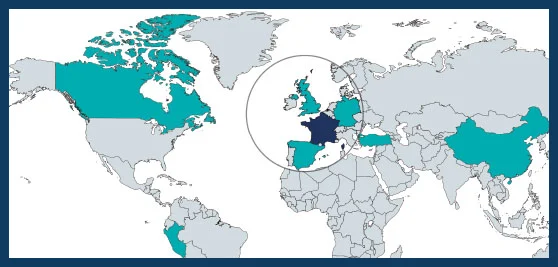03-2019 to 03-2022
€ 1,281,536
Dr Yunne Shin
yunne-jai.shin@ird.fr
Dr Bruno Ernande
bruno.ernande@ifremer.fr
Institut de Recherche pour le Développement (IRD), Sète, FRANCE
Institut Français de Recherche pour l’Exploitation de la Mer (IFREMER), Boulogne-sur-Mer, FRANCE
University of British Columbia, Vancouver, CANADA
Ocean University of China, Qingdao, CHINA
University of Hamburg, GERMANY University of Kiel, GERMANY
Peruvian Marine Research Institute, Lima, PERU
AZTI, San Sebastian, SPAIN
Middle East Technical University, Erdemli, TURKEY
UNEP-WCMC, Cambridge, UNITED KINGDOM

Global changes, including climate change and the growing demand for seafood, are driving marine ecosystems towards unprecedented states that require devising adaptation and mitigation strategies. Scenarios and models are invaluable tools to guide long-term strategic policies. However, although the degree of scenarios’ realism has greatly improved, the Darwinian evolution of fish populations is still neglected in future projections. Fish evolution and adaptation could mitigate the impacts of global change on fish populations and prevent their extirpation, an evolutionary rescue. But it could also push them towards evolutionary traps due to the erosion of their genetic diversity and thus reduce their evolutionary potential and resilience.
SOMBEE is designed to advance our capacity to forecast future changes in marine fish biodiversity. It addresses the role of eco-evolutionary dynamics and their consequences for the sustainable exploitation of fish resources in the future. The key open question addressed is whether exploited fish populations have the capacity of adapting swiftly enough to global change to ensure their persistence and their sustainable exploitation.
SOMBEE will : (i) develop a cutting edge evolutionary ecosystem model with primary focus on fish, (ii) project future changes in biodiversity and related fishing production under combined climate and fishing scenarios, and (iii) quantify the synergistic and antagonistic ecological, evolutionary and economic impacts of these drivers of change. Current ecosystem models explore how fish communities respond to global change by focusing on some key ecological processes (production, migration, physiology and trophic interactions), either alone or in some limited combination. SOMBEE will pioneer a modelling tool that includes all of these ecological processes and their impacts on life-history trait composition, genetic diversity and evolutionary potential of marine fish, providing a step-change in our capacity to simulate changes in biodiversity in response to scenarios of fishing and climate change. In addition, the coupling with a bio-economic model of fisheries will allow to project how eco-evolutionary changes impact fisheries economic profitability and sustainability.
SOMBEE will conduct its work in six regional marine ecosystems, with important contrasts in oceanography and ecology, history of fisheries, socio-economics, and management and policy frameworks: Pacific coast of Canada, Northern Humboldt, North Sea, Mediterranean Sea, Black Sea, Yellow Sea.
To be policy-relevant, the global change scenarios will be co-built with various regional stakeholders and then up-scaled to define generic marine socio-economic pathways across ecosystems. SOMBEE will actively engage four key stakeholder groups representing i) the primary recipients of the economic consequences of changes in biodiversity (fishing communities), ii) the most important actors implementing decisions that will impact on marine biodiversity (policy makers), iii) key players charged with providing advice appropriate for ecosystem-based management (fisheries science advisors), and iv) the standard-bearers for environmental concern and conservation (NGOs).